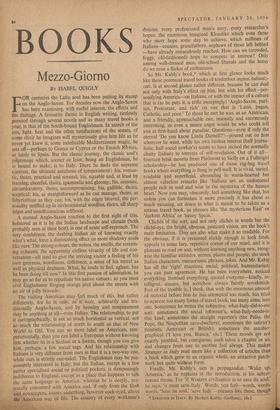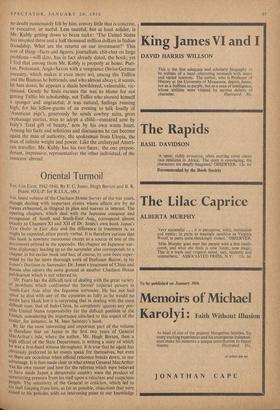BOOKS
Mezzo-Giorno
BY ISABEL QUIGLY FOR centuries the Latin soul has been putting its stamp ' on the Anglo-Saxon. For decades now the Anglo-Saxon has been examining, with rueful interest, the effects and the damage. A favourite theme in English writing, tirelessly pursued through several novels and as many travel books a year, is that of the South-bound Englishman. In search of the sun, light, heat and the other satisfactions of the senses, of some elixir he imagines will mysteriously give him life as he never yet knew it, some indefinable Mediterranean magic. he sets off—perhaps to Greece or Cyprus or the French Riviera, or lately to Spain. But the classic journey, the classic soul's pilgrimage which, sooner or later, being an Englishman, he is bound to make, is 'to Italy. There he finds the supreme contrast, the ultimate antithesis of temperament: his, roman- tic, theirs. practical and sensual; his, equable and, at least by training, cheerful, theirs, spasmodic-and gloomy; his, insecure, circumlocutory, theirs, uncompromising; his, gullible, theirs, sceptical; his, as straightforward as, he can manage, theirs, as labyrinthine as they can; his, with the edges blurred, the per- sonality muffled up in environmental woollies, theirs, all sharp edges and unselfconscious selfhood.
A normal Anglo-Saxon reaction to the first sight of this, bolstered as it is by the Italian landscape and climate (both probably seen at their best), is one of acute self-reproach. The very confidence, the dashing Italian air of knowing exactly what's what, have a diminishing effect on more shadowy souls like ours. The strong colours, the noises, the smells, the scream- ing exhausts, the apparently endless vivacity of life and con- versation—all tend to give the arriving visitor a feeling of his own greyness, woolliness, diffidence, a sense of his moral as well as physical drabness. What, he tends to feel, aghast, has he been doing till now? In this first passion of admiration, he may go so far as to repudiate his native virtues : so you meet civil Englishmen flinging orange peel about the streets with an air of jolly bravado.
The visiting American may feel much of this, but rather differently, for he is only, as. it were, arbitrarily and tra- ditionally Anglo-Saxon, and by heredity and temperament may be anything at all—even Italian. The relationship, to put it cartographically, is not so much horizontal as vertical. not so much the relationship of north to south as that of New World to Old. You can no more label an American, tem- peramentally, than you can label a European without knowing first whether he is a Sicilian or a Swede, though you can give him, perhaps, a few social tags. And his relationship with Italians is very different from ours in that it is a two-way one, while ours is strictly one-sided. The Englishman may be pas- sionately interested in Italy, but the Italian, except in a few rather specialised social or political pockets, is dampeningly indifferent to England, except as a place that happens to talk the same language as America; whereas he is deeply, per- sonally concerned with America and, if only from the film's and newspapers, knows something, however cock-eyed, about the American way of life. The country of every workman's dreams, every professional man's envy, every researcher's hopes; the enormous imagined Klondike which even those who sneer hope some day to achieve, which millibns of Italians—cousins, grandfathers, nephews of those left behind --have already miraculously reached. How can we (crowded, foggy, old-fashioned) hope to compete in interest? Only among well-dressed men, old-school liberals and the horsy do we raise a flicker of enthusiasm.
So Mr. Kubly's book,* which at first glance looks much like those perennial travel books of tenderfoot inglesi italianiz- zati. is at second glance rather different. because he can deal not only with Italy's effect on him, but with his effect—per- sonifying America—on Italians, or with the impact of a culture that is (as he puts it, a trifle sweepingly) 'Anglo-Saxon, puri- tan, Protestant, and rich' on one that is 'Latin, pagan, Catholic, and poor.' To those he met he was, as an American, and a friendly, approaChable one, instantly and enormously interesting, as even a minor angel would be who could tell you, at first-hand about paradise. Questions—even if only the eternal 'Do you know Linda Darnell?'—poured out on him wherever he went, while his own tireless interest (half journa- listic, half social worker's) seems to have incited the normally chatty Italians to torrents of self-revelation. Out of it all fourteen brisk months from Piedmont to Sicily on a Fulbright scholarship—he has produced one of those rag-bag travel books where everything is flung in pell-mell. It is vivid, varied, readable and superficial. abounding in warm-hearted but almost valueless remarks like 'Italians are an undistorted people rich in soul and wise in the mysteries of the human heart.' Now you may, obscurely, feel something like that, but unless you can formulate it more precisely it has about as much meaning, set down in what is meant to be taken as a serious travel book, as phrases like 'the mysterious East' or `darkest Africa' or 'sunny Spain.' , Clichés of the sort, and not only clichés in words but the cliché-eye, the bright, obvious, postcard vision, are the book's main limitation. They are also what make it so readable. For the obvious, if it' is presented slickly enough to look fresh, appeals to some lazy, repetitive corner of our mind, and it is pleasant to read on and, without learning anything new, recog- nise the familiar attitudes, scenes, places and people; the stock Italian characters, mannerisms, phrases, jokes. And Mr. Kubly has all the 'right' reactions, social, political, humanitarian; you can purr agreement. He has been everywhere, noticed everything, itemised everything, quoted everyone—kindly, in- telligent. sincere, but somehow always faintly novelettish.
Part of the trouble is, I think, that with the enormous amount of material before him he has attempted too much, has tried to squeeze too many forms of travel book, too many aims, into one. Sometimes he writes the subjective, what-Italy-did-to-me sort; sometimes the social reformer's,/ what-Italy-needs-is- this kind; sometimes the straight reporter's (the Pali% the Pope, the Neapolitan cave-dwellers); sometimes the satirist's (tourists, American or British); sometimes the autobio- graphical CI love you, Bianca,' etc.). These moods are not exactly jumbled, but contiguous; each takes a chapter or so, and changes from one to another feel abrupt. This makes Stranger in Italy read more like a collection of articles than a book which grew to an organic whole, an attractive patch- work but quite without form.
Finally, Mr. Kubly's aim is propagandist. 'Wake up. America,' as he explains in the introduction, is his subter- ranean theme. For 'if Western civilisation is to save its soul,' he says, 'it must save Italy.' Words, you feel—words, words, words. 'Save its soul,' save I iaV phrases like these, though * SIKANGLR IN ITALY. By Herbert Kubly. (Uolluncz, 18s.) no doubt passionately felt by him, convey little that is concrete, or evocative, or useful. Less tasteful, but at least solider. is Mr. Kubly getting down to brass tacks: The United States has invested three and a half thousand million dollars in Italian friendship. What are the returns on our investment?' This sort of thing—facts and figures, journalistic chit-chat on large problems—will date, has in fact already dated, the book; yet I feel that among them Mr. Kubly is properly at home. Puri- tan, Protestant, Anglo-Saxon with a vengeance (Swiss-German ancestry, which snakes it even more so), among the Tullios and the Biancas lie befriends, and who almost always, it seems, let him down, he appears a shade bewildered, vulnerable, vic- timised. Gently lie finds excuses (he was to blame for not getting Tullio his scholarship, not Tullio who showed himself a sponger and ungrateful; it -was natural, feelings running high, for his fellow-guests of an evening to talk loudly of 'American pigs'), generously he sends cowboy suits, gives orphanage parties, tries to adopt a child—ensnared now by Italy's 'fatal gift of beauty,' now by his own warm heart. Among his facts and solutions and discussions he can become again the man of authority, the spokesman from Utopia, the man of infinite weight and power. Like the archetypal Ameri- can traveller, Mr. Kubly has his two faces : the one prepon- derant, impressive, representative; the other individual, of the innocent abroad.



































 Previous page
Previous page